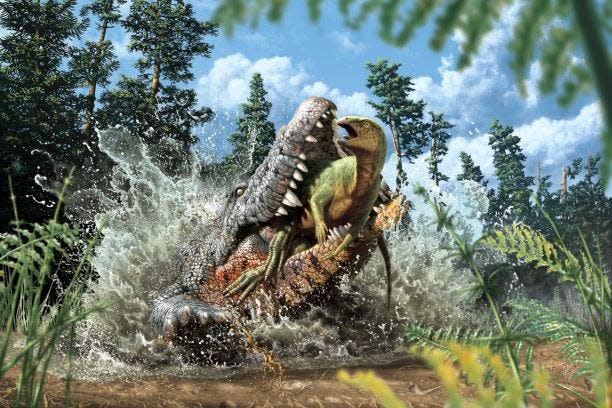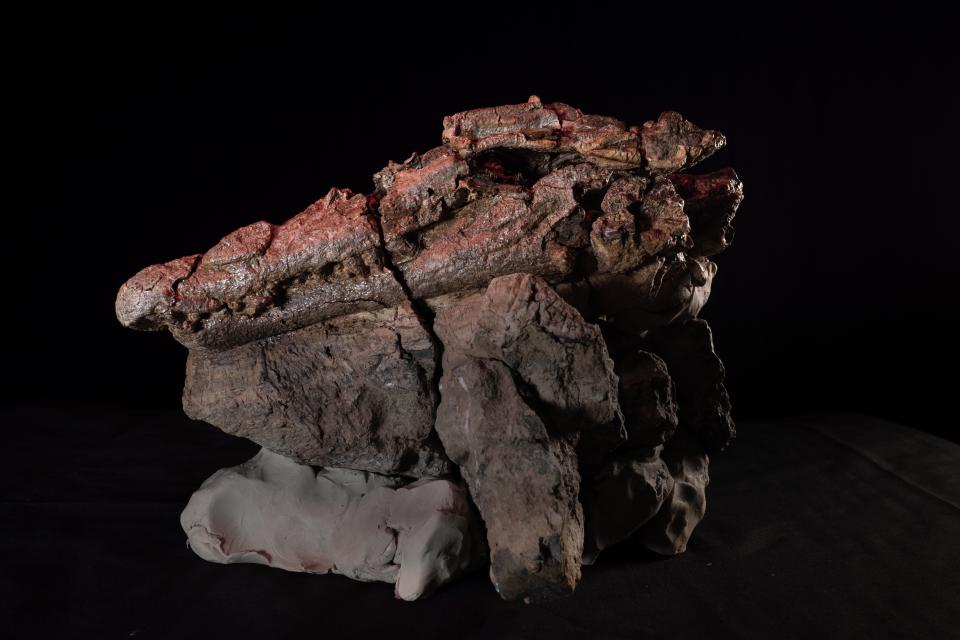This ancient 'killer' crocodile had a dinosaur as its last meal, research shows
A new species of crocodile that lived about 95 million years old was discovered in Australia, and researchers discovered it ate a dinosaur as its final meal.
The fossils of the crocodilian species were first found in 2010 near the Winton Formation in eastern Australia, a rock bed from the Cretaceous period, when most of the commonly known dinosaurs were roaming Earth.
Some of the fossils of the crocodile were partially crushed, but researchers noticed that within the fossils were numerous small bones that belonged to another animal. Now, researchers at the Australian Age of Dinosaurs Museum have identified those smaller bones as belonging to a dinosaur. Their findings were published in the journal Gondwana Research on Friday.

The freshwater crocodile, named Confractosuchus sauroktonos, which means "the broken dinosaur killer," was over 8 feet long. But Matt White, research associate at the museum and lead researcher, said it would have grown much larger. Researchers were unsure how the crocodile died.
About 35% of the animal was preserved; it was missing its tail and limbs but had a near-complete skull. Researchers then used X-ray and CT scans to find out what bones were inside the remains.

The findings showed the remains belonged to a 4-pound juvenile ornithopod, a group of plant-eating dinosaurs that included duck-billed creatures. The ornithopod's remains also were the first of their kind found in Australia, suggesting it is a newly discovered species.
What was left inside the crocodile's stomach was one of the ornithopod's femurs "sheared in half" and the other with a bite mark so hard a tooth mark was left. That led researchers to believe the Confractosuchus "either directly killed the animal or scavenged it quickly after its death."
"While Confractosuchus would not have specialized in eating dinosaurs, it would not have overlooked an easy meal, such as the young ornithopod remains found in its stomach," White said.
Ancestors: This crocodile ancestor discovered in Wyoming shows how it became the predator it is today
More: Dinosaur embryo found inside fossilized egg from more than 66 million years ago
The findings were "extremely rare" because there are so few definitive examples of dinosaurs being preyed on, and the discovery is the first evidence that crocodiles were eating dinosaurs in Australia. In August 2020, researchers discovered the fossils of "terror crocodiles" that could take down large dinosaurs with teeth "the size of bananas."
"It is likely dinosaurs constituted an important resource in the Cretaceous ecological food web," White said. "Given the lack of comparable global specimens, this prehistoric crocodile and its last meal will continue to provide clues to the relationships and behaviors of animals that inhabited Australia millions of years ago.”
What's everyone talking about? Sign up for our trending newsletter to get the latest news of the day
Follow Jordan Mendoza on Twitter: @jordan_mendoza5.
This article originally appeared on USA TODAY: 'Killer' crocodile found with dinosaur in its stomach in Australia

